#the story is half developed
Text

Gaslight, Gatekeep, Girl found dead in a hidden room.
[First] Prev <–-> Next
#poorly drawn mdzs#mdzs#lan xichen#jin guangyao#jiang cheng#wei wuxian#qin su#EDIT: Tumblr published an earlier draft with only half the notes I wrote so: late entry on my JGY thoughts.#Unlike the mystic powers of the stockmarket (what the OG meme is referring to) I think this situation calls for more active investigation.#qin su is such a deeply tragic character to me and I really wish we got a bit more from her.#Love everyone who sent me messages about her after the last time she appeared.#I think she needs a spin off of her being a transmigrator SO badly.#MDZS has so many interesting characters - but it sometimes fails to give them the proper room to really develop past a role in the plot.#That's just the consequence of writing a story like MDZS. Not every character in a book *needs* to have a rich inner life and backstory!#To do so would bog down the story and obliterate any notion of pacing. It's just not possible.#Jin Guangyao (nee Meng Yao) is unfortunately not free from this leeway rule. He is the culprit of this murder mystery plot#and thus NEEDS to encapsulate the themes of the book. And personally he's a 7 out of 10 at best on this front (in the AD).#MDZS is about rumours twisting reality and working towards truth. And about how people & situations are rarely ever black & white#JGY has his motivations. He's well written in regards to his actions making sense for his character.#What started as good traits (drive to succeed & improve his image) became twisted over time (do anything to maintain his image)#and it's a good parallel to WWX! He has the same arc (with different traits)! Bonus points for IGY in that regard.#but man....by the time we confront this guy for murder there's not a lot of grey morality. He's just...deep in the hole *he* dug.#There's a beautiful tragedy to it! More on JGY in later comics - this is getting pretty long already!
1K notes
·
View notes
Text

I did this one to celebrate Silver's bday back in 2021, a sonboy to me who deserves the world ;-;
#kagarts#rival silver#silver pokemon#trainer silver#pkmn#pkmn hgss#hgss#pkmn gsc#gsc#i think i've seen a lot of characterization of him that makes him like. edgy brooding and cynical#and yeah sure i half understand that given his whole story but i think a lot of ppl miss the whole like. growth part of his arc#learning to care not just for people that genuinely support him but his own team as well#competitive mindsets are temporary; love is forever to your team and your friends#but i think he can be a little rascal as a treat (a trait he totally didn't get from the rest of the quartet lmao)#don't enable me i could write an essay about him but i'm a full time student#character development good i definitely don't have a ton of headcanons stashed away with friends somewhere
1K notes
·
View notes
Text
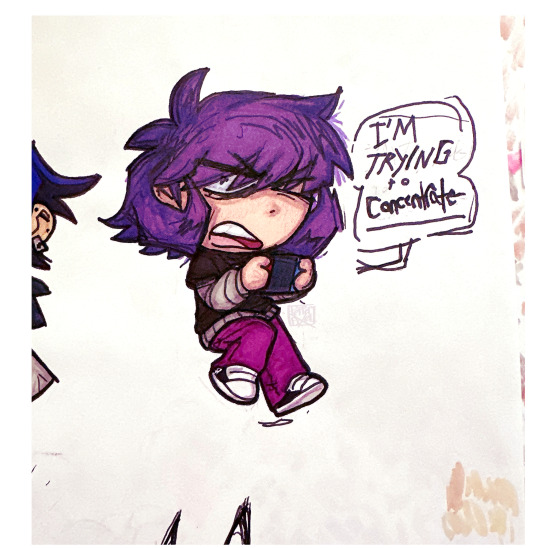
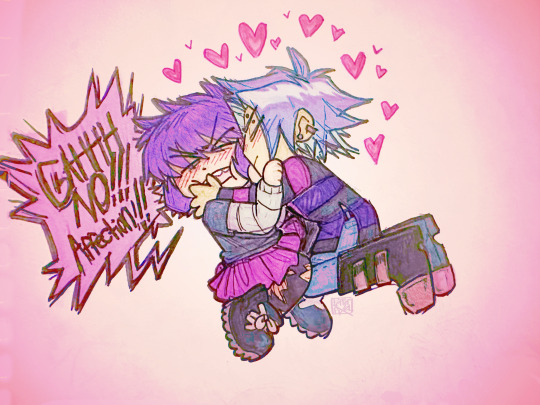
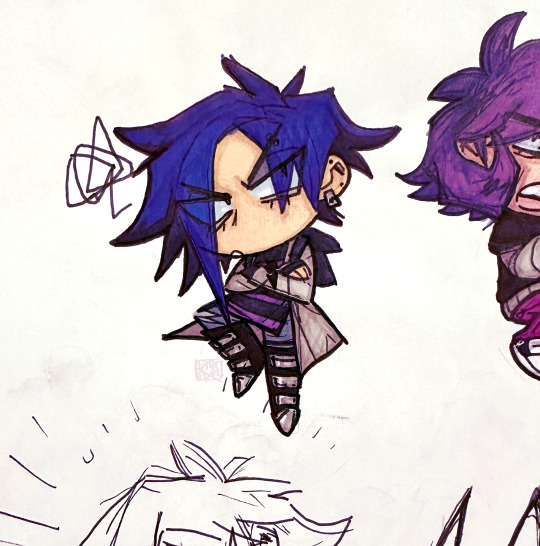


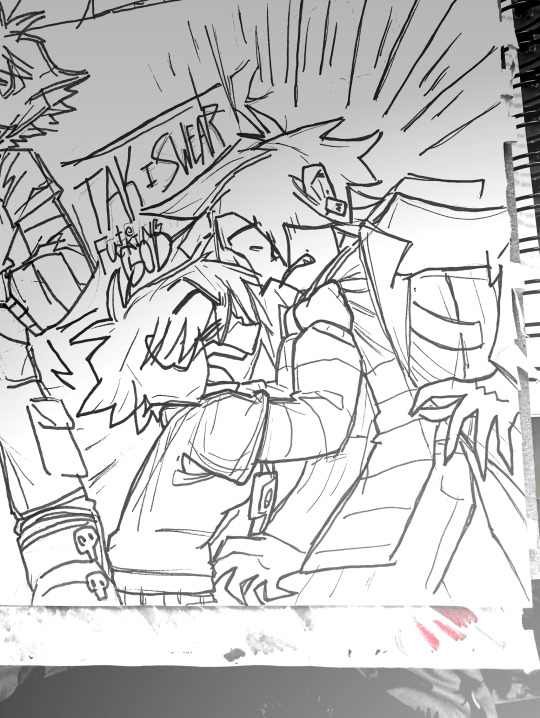
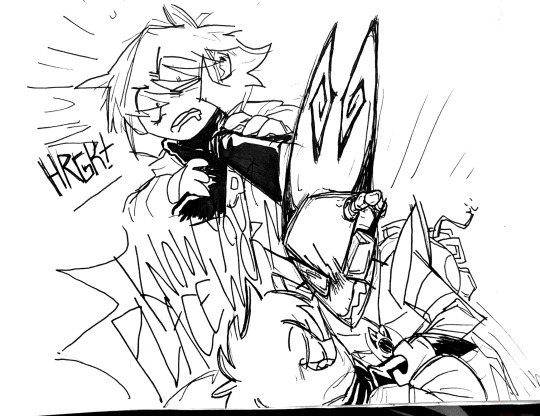
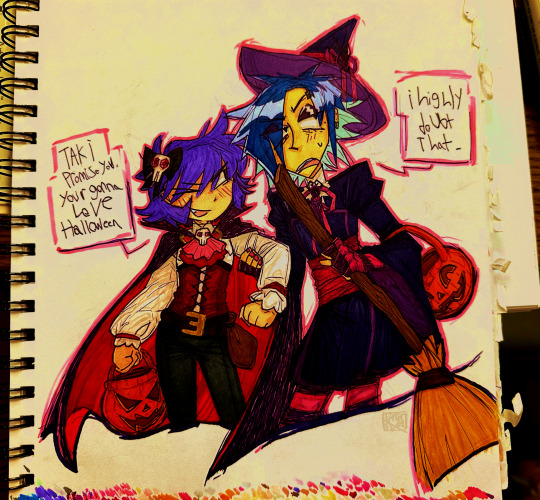
“put me on a pedestal and i’ll only disappoint you
tell me i’m exceptional, and i promise to exploit you
gimme all your money, and i’ll make some origami honey!
i think you’re a joke!!! …but i don’t find you very
fuuuuuuu~nyyy”
More tagr art!!! Assorted stuff this time! Featuring some cute chibi stuff. Some solo gaz’s, a lil uhhh. Comic of an altercation.. and a very belated Halloween pic I started drawing last Halloween and didnt finish lol. Also featuring lyrics from pedestrian at best cuz that song rllly rlly fits my ver of tak lol.
#invader zim#gaz membrane#invader tak#tagr#iz tak#iz gaz#tak#doodles#there toxic yuri!!! they’re all over the place!!! tak is tsundere insane alien who fueled by revenge it’s gonna be rough!#I think. there relationship would slowly grow and develop as gaz is helping tak w all her injuries#but I think they’d end up having a true true falling out sometime after take fully healed and gets her ship back.#and they’d be split up for a few years maybe? idk how long I’d want it to be. but! yeah.#absence makes the heart grow fonder and makes u realize how fucking stupid u are#and eventually they’d reunite and shit would be better lol#I don’t want them to be at each others throats forever that’d suck lol#theyre just definitely are moments where there at each others throats in the beginning#but they r also moments.. where they both feel true belonging and acceptance. like they never have before… and it blows there lil minds…#I also dO want gaz to go into space at some point w tak cuz that’d be fucking awesome#after they reunite again they can go explore the universe a bit#these r all very half baked ideas btw and also my brains mush cuz ive been drawing all day#so please excuse if said ideas suck. also please excuse all the typos lol#I might change my mind on the them separating idk… or maybe make it a shorter amount of time… idk!! I havent thought thru all this shit lol#it’s not like I’m gonna write a story or actually make a comic I’m just drawing random fanart#I don’t need to have all these thoughts all solidified lol
93 notes
·
View notes
Note
In your lights out!au when Eddie wakes up, how did Frank feel? Was he happy? Relieved? Were they a thing before everyone went to sleep, or did they realize they had feelings for each other afterwards?
I hope this hasn't been asked before! I'm just really curious
i'm thinking that before everything went dark, they were getting there. nothing was said aloud, but they were both having Mutual Feelings and Charged Moments that neither could ignore
just because i think it'd interesting if when Eddie wakes up, it's like no time at all passed. he walked Frank home just last "night". but it's been years for Frank - they have to reestablish where they had been with the added facets how time has worn on Frank. among other things
#and they only get like 5-6 months to figure their shit out!#thankfully for the both of them frank is less inclined to keep up pretenses. he becomes a bit of a go-getter#cause he's like 'well its been years. im tired & im dying. fuck it we ball'#its that class The Apocalypse Speeds Up Relationship Development thing#not drastically! it still takes them a good couple of months#this is actually why i had eddie wake up before julie#i wanted him and frank to have Some time together#5-6 months isnt half bad i think. sorta#rambles from the bog#wh lights out au#to make a long story short#feelings were realized but not shared pre-dark#and post-dark they're shared and somewhat established#how established can you be in their situation!#as for how frank felt... A Confusing Tangle Of Emotions#too complicated to write out here really
80 notes
·
View notes
Text
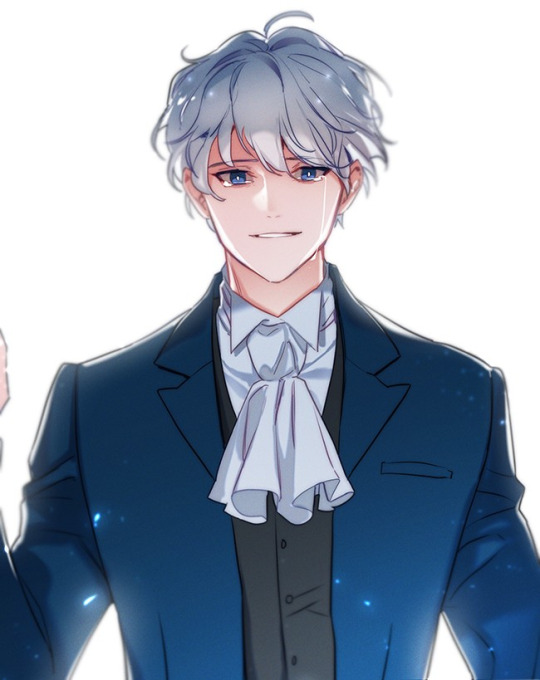


tfw when you write an entire novel with two protagonists that spent the entire plot getting closer to each other, becoming best friends and eventually both of them deciding they would rather die than allow the other to not live a long, fulfilling life, their friendship carrying most of the emotional weight of the entire plot and the emotional climax being one of them sacrificing his life so the other can live and then the other crossing literal universes to find him, a tearful smile in his face as he confesses how much he missed him. which is the scene you wanted to write and show the most because, again, this is the pay off to the slowburn you've been writing in the entire novel and what everything has been building up to since the very first chapter. and then you end the novel by having them share a smile, finally confident they'll be able to have a happy future.
but you also just gotta have one of them marry offscreen because everyone knows you can't be happy if you're not in a het marriage with kids lmao it's whatever it's okay i'm fiNE-
#i talk a lot <3#the greatest estate developer#lloyd frontera#this post was going to be so much more bitter this is me being nice akjshdkahdk#i just....... i'm sad alsjdsjkal#and i don't think i'm wrong to be. like i'm not disapointed bc i don't actually expected lloyd and javier to be together#i'm not that optimistic lmao#but i did have the hope tged would have no romance#because lloyd and javier were already doing so much in the emotional and relationship development front of the plot#that adding romance just feels. awkward. like an aside. an add-on that affects none of the plot and is just there to make sure#no one accidentally gets confused and think those two are in love#and guess what! most of the romance does happen in literal side stories! literally an add-on that does nothing for the plot! i hate it!#it's the heteronormativity and amatonormativity of it all :/#do i think it would've been cool for llojavi to be canon? absolutely! do i think it was necessary for the plot? nope!#they were already perfect the way they are! their friendship is the core of the entire plot and their relationship to each other#is what ultimately moves much of the plot in the latter half!#which is the way relationships should work in fiction! not just have them for the sake of having them!#lloyd didn't need a romantic subplot because the plot was already working perfectly without it!#also what's the point of having a character constantly think about what their idea of 'happy life' is if you're not going to challenge it#it's about the hero's journey of it all!!!#i have things to say dang it!#javier asrahan#tged
297 notes
·
View notes
Photo
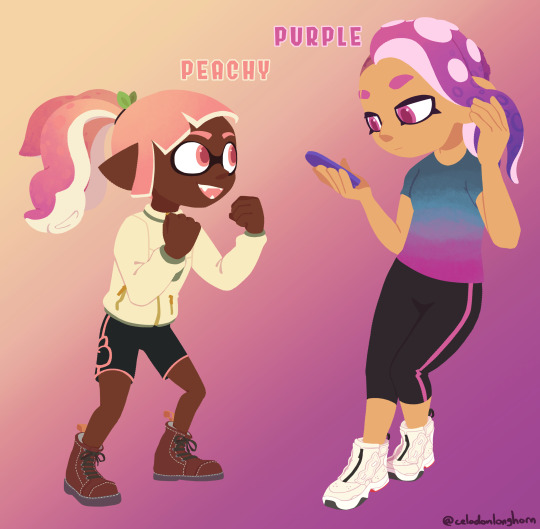

(if the second is tough to read, full size is here!)
Wow, uh. Hello everybody!! I’m very happy to see people like the roommates comic! Happy Pride to me, I guess??
Anyways, I thought I’d follow up with the reference I drew back in October for the full-fledged characters that the comic inspired. The designs for the two roommates were thought up in like five minutes, but a friend of mine encouraged me to develop our characters together, and I ended up getting a bit attached. Okay, more like really attached. You’ll be seeing an awful lot of them.
But I’ve still got lots of ideas for Splatoon comics in general--hope you’ll like those too!
#splatoon#splatoon 3#my art#purple and peachy#so the first step in character development was 'splitting my own neuroses and giving each one of them half the list'#and back in october when i posted this on reddit somebody responded with 'adhd and autism' and i was like lol i guess so!#despite me not being diagnosed with either#and now it's june and uh. well. Funny Story About That
216 notes
·
View notes
Text
strangely the writers hate gale for completely different reasons but still don't make jokes about how we all want to fuck mystra. in EA if you made that kind of joke about cazador in front of astarion he threatens to kill you. as he SHOULD.
#it's mind boggling to read half of these listicles and interviews#and see the writers themselves encourage just awful takes#from ''let's only talk about how hot the women are and not their stories and character development''#to ''even if you don't like wyll recruit him so you get mizora!''#to ''yeah karlach's main character trait is 'labrador' what do you mean she has greater depths than that''#there's so many funny jokes and memes about the game that don't fall into these categories. just get good jokes?
55 notes
·
View notes
Text
RS3's story problems these past few years is a great example of "boring characters cannot carry a good plotline"
#spy's talky things#a clannie is going through egwd in timeline order atm and so i am once again stuck thinking about these things#like the plot points of egwd/zamorakian civil war/fort are all fine#(barring a few character-specific plot points that suck ass + the presentation of those plot points leaving a lot to be desired)#the characters are so ungodly boring. like i just do not give a shit about any of them#and the characters we had lost a lot of development in the ending of edwd and instead became flat#there is a sincere problem if the player characters is saying ''i couldnt have done this without you all :)''#and i watch the scene like ''who the fuck are half these people''#great characters can carry a dogshit story but a great story cannot carry boring characters#you know... is it any wonder lorehounds who like to write essays are still on board with the lore#while those who wrote fanfic/drew fanart have fallen off#one is fact oriented and the other is character driven#i love writing a good essay in the tags <3#add: to everyone reblogging this and adding their own tag essays please by all means keep it up <3
17 notes
·
View notes
Text
begging solmare to stop insisting to us that EVERY mc would be most comfortable at the house of lamentation in nightbringer. The brothers aren’t the only romantic options. Why should an mc that, for instance, is in love with solomon (or is even just good friends with him)... the only character from their actual time... be forcibly told by the narrative that they’re more comfortable around versions of the brothers that are essentially strangers to them?
#obey me#obey me nightbringer#obey me nightbringer spoilers#obey me spoilers#also begging solmare to stop quarantining simeon and barbatos in the bonus story. i don't care!!! let me see and interact with THEM#& i've been tired of the lessons where we're forced to systematically interact with EVERY brother one by one for years#i'm sorry but it is just dry as hell to me#meanwhile the other characters are stuck with INCREDIBLY uneven scraps#no i DONT like being robotically forced to hug or kiss the characters my mc has no interest in#while i go sometimes over half of seasons without seeing the characters i actually care about romantic development for
77 notes
·
View notes
Text
Its insane how SRTT and SRR are both terrible for slightly different reasons. This is why I propose we take bits and pieces from both games and create a new united storyline
#saints row#I only half joke#I'm actually thinking about this#taking place in Santo Ileso with panteros luchadores marshall and maybe idols#i might write post about this in the future#I'm only taking this half seriously because I don't mess around with AUs much (prefer spending the energy developing filler stories)#sr
13 notes
·
View notes
Note
I really like matakara and I hope that in the end he will be happy for his brother because arajin is a toxic character in my opinion he has no charisma he is selfish he is obsessed with a girl who doesn't give a damn about him I would like the end of the anime to be matakara forgives arajin but doesn't want him in his circle of friendship because he is a person who is not worth it he wouldn't bring anything beneficial to matakara.
Matakara already has best friends who respect and value him, but he hasn't realized it yet.
Sorry about the text, I'd be very happy if you read it.
i don't share quite the same level of disdain for arajin as you do, but I do agree that it'd be nice to have matakara fully acknowledge komao and zabu's place in his life in the finale.
with arajin as a character, your milage may vary quite drastically. in the first 6 episodes he is given none to few redeeming characteristics. but I can very much understand how it must feel to be idolized by matakara when fighting is something he very deliberately cut out of his life years ago. i adore matakara as much as the next guy, but the boy's has some real issues with reconciling the version of ara that exists vs the one he wants to believe in, as shown by recent episodes. the same way ara deludes himself with a perfect image of mahoro, matakara did with him. but I understand not enjoying ara regardless of all this, because it's hard to logic yourself out of disliking a character, but I think he's a very worthwhile part of the show especially now that the plot is moving forward
#bucchigiri?!#i dont hate arajin nor do i overwhelmingly love him to be clear#i think he's an effective took of the story who has his charming moments and infuriating moments#paaaaart of me wishes the first 6 episodes didn't put such a main focus on him since he doesnt really develop much there#i mean i get hes technically the pov character but almost none of his arc happens in the first half so it feels a tad wasted#good for arajin enjoyers tho#ask#working on clearing my ask box
11 notes
·
View notes
Text
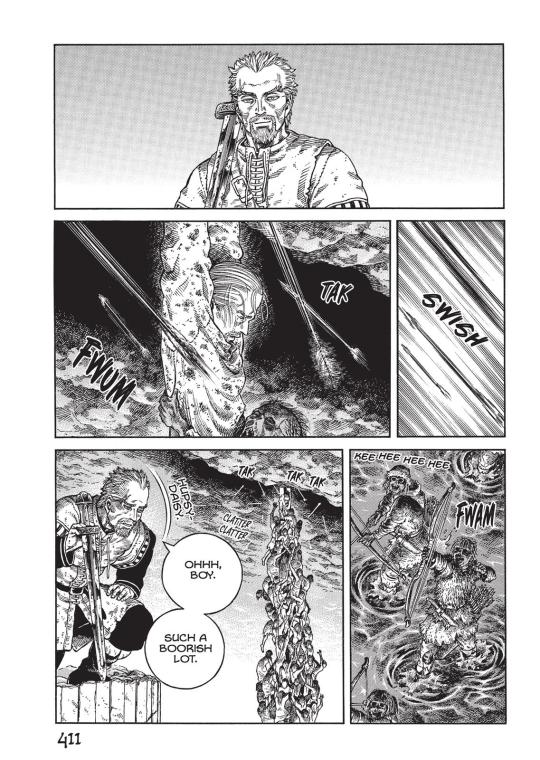
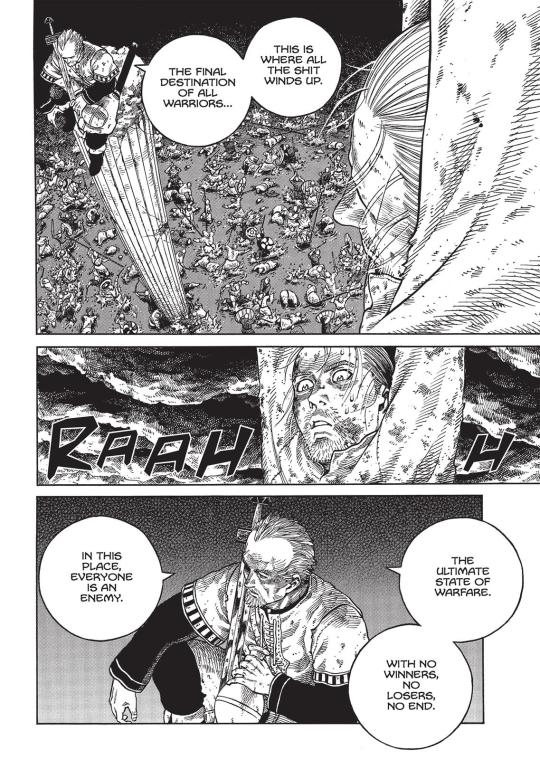

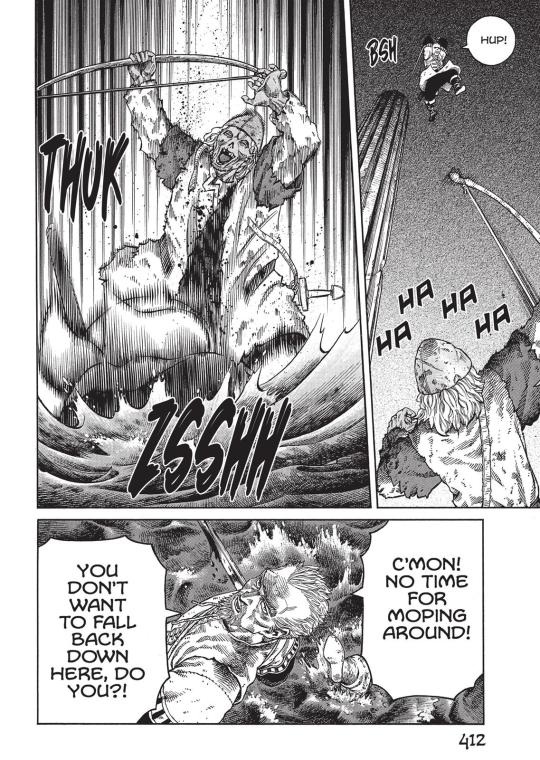
we get another badass askeladd moment lol, but i will say i like that just this short bit symbolically sums up the first arc. askeladd comfortably sitting high up above the vikings' carnage, dressed exactly like them, almost perfectly inbetween the pit of violence and out of the gorge. he approves thorfinn not having the same attitude as them and goes down to join the fighting when they might interfere with thorfinn. that's a bit more generous, but i think u can argue that's thorfinn's impression of him. finally we get askeladd sacrificing himself for the goal he wants to happen (thorfinn moving past him, and not being like him, and not pictured canute's role regarding Wales)
#personal#vinland saga lb#i feel its half for the story and half from thorfinn's imagination of him. bc theres no way thorfinn at askeladd's death was processing#what happened lol. im not even sure if he thought abt it later. esp manga thorfinn who seemed much more comfortable in staying the same#even if askeladd said the same thing telling him to get over him#anyways i wonder if askeladd will show up again. i absolutely feel him being this likable is a bad thing#a lot of media will have fan favs that die/leave the story and i feel that guaranteeing the fans begging for scraps of them later#anyways thorfinn character development timee
9 notes
·
View notes
Text
The pain and suffering that is wanting to share a part of your oc's story that youve been thinking of for over a year but at the same time its so far in the future of their timeline + semicanon that you also want to hold off on talking about it
#cjj sayeth#ive been sitting here for the past year and a half like.#they dont know about the pseudocanonical rematch fight between v form drill and overlord that gets very shonen.#calm down jj you are still developing his merc story bestie. you havent even gotten to his mentor figure bestie#one day. one day#and one day i will draw fight scenes with big bulky robots
64 notes
·
View notes
Text
I just saw somebody asking why everybody totally believes Robin and Vickie are gonna be together in S5, but a lot of people still doubt byler. What's the difference, when both ships are very obviously written as endgame?
To me, there are two differences.
The first one is that byler would (will?) be a main queer pairing, while rovickie is a secondary one. There are a lot of current shows with secondary queer pairings, it's not so big anymore (it's big. Sadly, it's still big. Just not as big as a main one).
And the second one is that rovickie is a sapphic pairing. And we all have seen how, the very moment you leave the openly, officially queer shows aside, sapphic characters (emphasis on "characters" as opposed to "people") are more widely accepted than achillean ones. And yes, the first reason for this is the fetishisation of lesbians, but that acceptance is now more general than that.
A secondary wlw pairing isn't new. It's been done a lot of times since the 90s, sometimes better, sometimes worse, but it's been done before, both in queer and not queer shows. A main mlm pairing has never existed in a show that's not specifically queer. That's why people see byler and rovickie differently, and that's also why byler is gonna be revolutionary.
#byler#rovickie#stranger things#i'm still very interested on how they're gonna develop rovickie#robin doesn't deserve a half assed love story#if her story isn't beautifully written and compelling i riot
21 notes
·
View notes
Text
15 questions tag
tagged by @ahordeofwasps a little while back, so thank you! I'm going to fill this out for Vivien from claws, since it'll be good to flesh out and play with his character more outside of unhinged drafting hours.
interview under the cut, with a mild content warning for referenced self-harm and suicidal ideation.
Rainier's done a lot of interviews. Vivien's watched all of them, over and over and over. Sometimes, when he needs to escape his body and mind both, he’ll mouth his own answers alongside Rainier’s. It’s almost like they’re sitting together on the stupid TV sofa, under the bright lights.
“So, are you named after anyone?”
“My dead brother.” He’s always wondered what Rainier would think of that. “Is that weird? I loved him. Now it’s like he’s not dead, even though he is, and he left me.”
Rainier wouldn’t think he was weird. Rainier would understand. Of everyone in the world, he’s sure Rainier would understand.
“When’s the last time you cried?”
Vivien stares at the dark ceiling. His arms are still stinging, freshly scrubbed and wrapped. New scabs to pick tomorrow. “About twenty minutes ago.”
“Do you have kids?”
“If someone ever knocks me up, I’ll kill myself.” The thought of it makes him want to claw his insides out. There’s no-one, not even Rainier, he’d do that for. Would he adopt, though, if Rainier wanted? He’s not good with kids, they make him feel awkward and ungainly, but he thinks Rainier would be a good dad. Maybe that would work.
“Do you use sarcasm a lot?”
“I grew up on the internet, what do you think?”
“What’s the first thing you notice about people?”
“How big they are. How tall. If they could fuck me up if they decided to.”
“What’s your eye colour?”
“Dark brown.” His are darker than Rainier’s. He’s checked. Rainier’s are still brown, but they’ve got warm little flecks of honey in them, and they tint gold in sunlit photos. He could gaze into them for hours.
“Do you prefer scary movies or ones with happy endings?”
“Horror movies are better than any other kind. They show what reality feels like. They’re more real than real life.” He likes the ones that hurt—him or the characters. The ones were everyone dies at the end, or where the ones that survive are ruined forever; stories where you can’t change back. He likes the way it feels, when the terror fades the world out, when it lingers in the dark afterwards, keeping you awake.
“Have you got any special talents you’ve been hiding?”
When Rainier says no, he sounds adorably humble, ducking his head a little with a self-abashed laugh. He’s too busy being the best demonologist in history to have extra talents. Vivien knows he’s good in bed, that’s not even a question, but he supposes it doesn’t really count as a hidden talent. Not one for a morning talkshow interview anyway.
When he says he has no talents, he just sounds pathetic. If he has to interview with Rainier, hopefully they skip this one.
“Where were you born?”
“At home. I was a surprise—surprise baby, surprise birth. I never did anything right, not from conception.” He’d never say where home was, not on TV. Someone might go looking. Someone might go finding.
“What hobbies do you have? What do you like to do for fun?”
“I don’t know, listen to music, I guess? I don’t like going out for it, though, I hate crowds. And loud noise. And drunk people.” Keeping track of what Rainier’s doing doesn’t count as a hobby—that’s a calling. “I can’t really have a bunch of hobbies—they all require money and interacting with people. Is skiving off the therapy your sister keeps making you go to a hobby? Cause I do that and it’s fun.”
“Do you have any pets?”
“I wish. I want a tarantula—they’re so beautiful, so delicate, and I don’t see why I still can’t have one. It’s not like they leave hair everywhere for some other tenant later to get allergic to or whatever.” Vivien sighs, glancing at the many, many printed-out arachnids decorating his wall amongst the band posters. “Besides, I couldn’t afford one anyway. Not like Jaimie would help me pay for it.”
“Were you a sports man? How do you keep yourself in shape now?”
Vivien snorts. “I ditched every P.E. lesson I could. I don’t want to get undressed and then sweaty around a bunch of girls, or deal with a bunch of stupid bullshit because they can’t let me in the boys changing room. Fuck all that. I don’t care if I’m not ‘in shape’. It doesn’t matter anyway if I can’t get surgery yet.”
“How tall are you?”
“Like. Five-five, I think? Five-six? Something like that.”
“I’m sure we can all probably guess, but what was your favourite subject in school?”
“Biology. Seeing how things fit together, how they work—looking at the insides. Doing dissections. Three girls ran out of the class when we had to cut up a sheep’s heart, it was fucking pathetic.”
Not that he got the best results. They rely so much on remembering everything, exactly correct, and it’s not his fault if stuff just won’t stick. He knows what he needs to.
“You have what a lot of people might call a dream job—is it? Or do you dream of working somewhere other than Riess University’s demonology department?”
“I don’t want to work for those fuckers at Riess, I just want…” Vivien stares at the screen, at Rainier three inches high rendered in flat pixels. “I just want to be with you. In whatever way you’ll have me.”
---
Here are the questions for anyone that needs it!
Are you named after anyone?
When was the last time you cried?
Do you have kids?
Do you use sarcasm a lot?
What’s the first thing you notice about people?
What’s your eye colour?
Scary movies or happy endings?
Any special talents?
Where were you born?
What are your hobbies?
Have you any pets?
What sports do you play/have played?
How tall are you?
Favourite subject in school?
Dream job?
claws taglist: @belovedviolence @foxboyclit (ask to be +/-)
no-pressure tagging @loopyhoopywrites @zmwrites and @pens-swords-stuff
#writeblr#tag games#15 questions#oc interview#c: vivien webb#wip: claws#it's so very deeply Vivien to have half an interview of him be about Rainier#boy develop an actual sense of self that doesn't centre around the man you're obsessed with#i love this horrid little man#had fun formatting this more like a little interview story like i've seen some other people do!
16 notes
·
View notes
Text
The Shocking Redemption Arc of Chester Arthur
To my great pleasure, I get to tell you about Chester A. Arthur. If you don’t know his story, that’s a surprising statement, because most people don’t even recognize his name as one of the presidents. That’s a crying shame, because this guy has the most fascinating character arc of any president I’ve come across so far. He entered the presidency as a despicable, corrupt, conniving political lackey, and left it as--
Well, I’d best get on with the story.
Chester Arthur started out as an idealist. He was the son of an abolitionist Baptist minister, and though he dropped the religion in adulthood, he remained devoted to abolishing slavery. He became a lawyer with a New York firm that argued several civil rights case, and he rose to fame in 1854 when he served as the defense attorney for Elizabeth Jennings, the Northern version of Rosa Parks. Arthur’s victory in her case led to the desegregation of New York City’s public transportation.
During the Civil War, Arthur got an appointment as New York’s quartermaster general. After the war, Arthur returned to civilian life and became a Republican “party man” who worked behind the scenes to draw in voters, funding, and supporters. He and his wife Ellen (called Nell) both loved the finer things in life, which drove Arthur to do whatever he could to gain fame, wealth, and social status.
This is where I need to explain the spoils system. For the first hundred-plus years of American politics, all federal positions were filled by appointment. When a new president came into office, he could award government positions to his supporters--"to the victor go the spoils". Federal employees were required to donate money to the ruling party. There were no requirements for education or relevant experience. Any job could be filled by anyone with the right connections. If you think that sounds like a breeding ground for corruption and cronyism, you’d be absolutely right. By the 1870s, the system was getting extremely corrupt, and there was a growing push for reform.
But not by Chester Arthur. He owed his career to the spoils system. Through his work in the party, he became the right-hand man of Roscoe Conkling, New York’s senior senator and the state’s “political boss”. Conkling was a flamboyant showman, a magnetic politician, and a ruthless man. He had been a major supporter of Ulysses S. Grant’s presidential campaign, so Grant gave Conkling control over all the federal appointments in New York. Conkling used his power to fill positions with his friends and supporters, and he was brutal in attacking anyone who got in his way.
Because Chester Arthur was Conkling’s most loyal supporter, he got the best federal job in the country—Controller of the Port of New York. Before income tax, around 60-70% of federal funds came from the tariffs at this one port. The controller got a salary similar to the president’s, plus he was able to take a percentage of all the fines they levied. At the height of his power, Chester Arthur made $50,000 a year, which is a lot when the average skilled worker at the time made $500. (A rough estimate puts his salary at $1.3 million in today’s dollars.)
Arthur was living the high life. He racked up huge tailor bills. He had a gorgeously furnished house. His job allowed him to force his employees to donate a percentage of their salary to the Republican Party, which gave him even more power within the political machine. He bought huge amounts of wine and cigars that he handed out to people he was wining and dining for the good of the party. His wife resented that he was rarely home because of his political work, but Arthur loved the machine too much to stop.
After his 1876 election, President Rutherford B. Hayes desperately tried to reform the spoils system, but was blocked every step of the way by Roscoe Conkling. Finally, in 1878, Hayes managed to remove Arthur from his position as port controller, under suspicion of corruption, which allowed Arthur to spend more time working for New York’s political machine.
In January of 1880, Arthur was in Albany working for a political campaign when his wife caught pneumonia. By the time Arthur got home, Nell had fallen into a coma, and he wasn’t able to speak with her before she died. He felt guilty over her death, and especially the lack of closure caused by his devotion to politics. But instead of changing his ways, Arthur moved in with Conkling and became more devoted to politics than ever.
Which brings us to the 1880 Republican Convention. The Republican Party was split between two warring factions—the Stalwarts like Conkling who wanted to keep things the way they were, and the Half-Breeds who wanted civil service reform. President Hayes refused to seek re-election (partly because Conkling had made his life miserable) so these two factions somehow had to agree on a new candidate. Conkling supported a third term for Ulysses S. Grant. The Half-Breeds supported James G. Blaine of Maine—who happened to be Conkling’s mortal enemy.
James Garfield was there to nominate John Sherman—the Secretary of the Treasury and the younger brother of the famous Civil War general—and I can’t go any further in this story before I tell you a little bit about him. James Garfield is one of the most ridiculous overachievers in the realm of American politics. He was born into a dirt-poor farming family (he’s the last president ever to have been born in a log cabin). At sixteen, he left home to work on a canal boat, but quit after he nearly drowned, and his mother and brother scraped up enough money for him to go to school. His first year, he paid for his tuition by working as a school janitor. His second year, the school hired him to teach six classes (while he was still a student!) and then added two more because of how popular he was. By the time he was twenty-six, he was president of that same school. He became a lawyer and was elected to Ohio’s state legislature. During the Civil War, he became the youngest person to earn the rank of general. While fighting in the Civil War, his friends put his name in as a candidate for the US House of Representatives, and Garfield won even though he refused to campaign. He then served several terms in the House, where he became popular, but he refused to seek the presidency, because he’d watched several friends become warped by their presidential ambitions.
At the 1880 Republican Convention, Garfield was the more popular Ohio candidate, but insisted he was there only to nominate Sherman. At one point in his nominating speech, Garfield asked the audience, “Now, gentleman, what do we want?” To Garfield’s horror, one man shouted, “We want Garfield!”
Garfield remained loyal in nominating Sherman, but the spark had been lit. The voting went round after round after round for two days, with the votes being split between Grant, Blaine, and Sherman, with no one getting enough to win the nomination. Garfield got one vote in the third round. In the thirty-fourth round, Garfield suddenly got seventeen votes. Garfield stood to protest, saying no one had a right to vote for him since he hadn't consented, but the president of the convention--who was secretly thrilled because he liked Garfield more than any of the other candidates--told Garfield to sit down.
By the thirty-sixth vote, Garfield had won the nomination.
Now they had to choose a vice president. Several of the delegates got the idea to throw a bone to Roscoe Conkling. He was furious that Grant had lost the nomination, and he was vindictive. Conkling controlled New York’s political machine, so without him, the Republicans would lose New York, and without New York, they’d lose the election. He had to be placated. So the delegates nominated Chester Arthur, his right-hand man, as vice president.
Conkling told Arthur to refuse the nomination, but Arthur accepted, saying it was a greater honor than he had ever hoped to achieve. That's putting it mildly. The only position he’d ever held was port controller, and he’d been removed from that. Plenty of people thought nominating him was a horrible idea—a man like Chester Arthur only one step away from the presidency? But other people thought it was a shrewd political move—it would placate Conkling’s faction of the party, and Garfield was young and healthy and would rule in a time of peace. It wasn’t like there was any chance he’d die in office.
After Garfield was elected, Arthur immediately started causing problems. He all but openly boasted of buying votes in the election—which was not a great look when it had been a close race. He was completely on Conkling’s side in his war against Garfield. After Garfield appointed Levi Morton, a Stalwart, as Secretary of the Navy, Conkling sent Arthur and another lackey to drag Morton out of his sickbed--forcing him to drink a bracing mixture of quinine and brandy--and bring him to Conkling’s house to get chewed out, which caused Morton to resign. Conkling forced another Stalwart Cabinet nominee to resign on inauguration day.
Then Conkling went to war over the federal appointments. At first, Garfield placated him, appointing several of Conkling’s candidates. But then Garfield nominated Judge Robertson as Port Controller of New York Harbor. Conkling was livid. That was the prime federal position, a major source of Conkling’s power in the party, and Robertson was one of Conkling’s political enemies. In Conkling’s mind, Garfield had stabbed him in the back. Arthur agreed, and openly bad-mouthed the president to the press.
Conkling and the other New York senator resigned their Senate seats in protest—a dramatic political move. In those days, state legislatures voted for senators, and Conkling believed that since he controlled so many New York politicians, they’d easily get re-elected to their old seats. Unfortunately, the legislature was sick of being under Conkling’s thumb. The election became a drawn-out battle, and Chester Arthur went to Albany to help Conkling in his campaign.
While he was there, the unthinkable happened. On July 2, 1881, James Garfield was shot at a train station by Charles Guiteau, an insane office-seeker. Guiteau had come to the White House every day for months seeking an appointment under the spoils system. When that failed, he decided God wanted him to get Garfield out of the way so the spoils system could continue. After he shot the president, Giteau shouted, “I am a Stalwart, and Arthur will be president!”
As you can imagine, that made things really bad for Arthur. He’d just spent months fighting the president tooth and nail, and the assassin had mentioned his name. Plenty of people thought Arthur had something to do with the shooting. He and Conkling both needed police details to protect them from lynch mobs.
Arthur didn’t want to be president; in his mind, vice president was the perfect job—a position with a lot of political leverage, but no responsibility. He went to the White House hoping to convince Garfield that he had nothing to do with the shooting, but the doctors wouldn’t let him in the room. He managed to speak to the First Lady, where he got choked up with emotion and was observed to be in tears. A reporter later found him in the house where he was staying in Washington, and noted he'd obviously been weeping.
To Arthur’s relief, Garfield seemed to get better. The bullet had missed his spinal cord and all his major organs. If he’d been left alone, Garfield would have made a complete recovery. Unfortunately, his doctors repeatedly prodded the bullet wound with unsterilized instruments, and Garfield fell victim to a massive infection. He lingered for months, slowly starving and rotting to death.
Through all this, Arthur stayed in New York and refused to take up presidential duties; with so many people accusing him of the assassination, he didn’t want to make it look like he was preparing to usurp the throne.
It eventually became clear that the assassin had acted alone, which laid the rumors to rest, but no one wanted Arthur to be president. James Garfield had been a man of the people. The working class considered him one of their own, proof that anyone could rise from poverty and become president. He was an idealist, a champion of civil rights, a family man who lived modestly. For the first time since the Civil War, a president had been supported by both the north and the south, and the country had come together in grief. Chester Arthur was Garfield’s exact opposite—a conniving political lackey who’d become a millionaire through corruption.
James Garfield died on September 19th. To the American people, it looked like their worst nightmare had come true. Conkling’s lackey was in the White House, and now Conkling would rule the nation the same way he’d ruled New York.
Yet, to everyone’s surprise, President Chester Arthur became a completely different man. In one of his first speeches, he listed civil service reform as one of his top priorities—a shocking move for a man who’d become president through the spoils system. Soon after Arthur’s inauguration, Conkling demanded he name a new Controller of the Port of New York. Arthur angrily refused and called Conkling’s demand outrageous. Conkling stormed out in fury and never forgave Arthur. (Arthur did later risk his reputation to nominate Conkling for the Supreme Court, but Conkling, ever petty, refused the position.)
Arthur didn’t have a complete personality transplant. He still lived lavishly, hosting lots of state dinners. He still preferred the social duties of the presidency to actual government work, and he was a hopeless procrastinator. Always fastidious, Arthur refused to move in to the rotting, rat-infested White House until they fixed up the dump, and he ran up extravagant bills during the remodel.
Yet, as a president, he was...respectable. He worked for African-American civil rights. He started a major process of rebuilding and reforming the outdated and corrupt navy. He did sign the Chinese Exclusion Act, but he had vetoed an earlier, harsher version and only signed a much-reduced one (that probably would have been voted in anyway if he’d vetoed it). That remodel of the White House, even if it ran over-budget, was long overdue.
Most shocking of all was his unswerving devotion to civil service reform. He continued an investigation into a government postal scandal, even though everyone assumed he’d drop it. He voiced his continuing support for reform efforts. In 1883, Arthur signed the Pendleton Civil Service Reform Act. As written, the act required only 10% of federal jobs to be assigned based on merit, and even that required the president to take action to enforce it. People assumed that Arthur would sit back and do nothing, so the spoils system would remain in place. Yet Arthur immediately formed a commission to enact the reform, even appointing some of his old enemies. The man who’d benefited most from the spoils system became the one to finally destroy it.
How do we explain such a complete and sudden change? Part of it’s a matter of personality. If I can indulge in a bit of meta, Chester Arthur seems to be a textbook example of the sanguine-phlegmatic temperament—someone who wants to fit in with the crowd, to go with the flow. As a political lackey, this made him self-serving and amoral, but as president, the crowd he had to impress was the American people. After months of getting crucified in the press, with tons of articles saying what they didn’t want him to be, he’d have plenty of motivation to become what they did want him to be.
A more important motivation, though, was death. His wife’s death was likely the first shock that would make him step back and take stock of his political career. Garfield’s death had an even more profound influence on him. The spoils system had led a madman to murder a president in Arthur’s name; if anything could motivate a man to change the system, that would be it. Even more profound than that was his own death. Not long after entering the White House, Arthur was diagnosed with a fatal kidney disease. He hid the diagnosis during his term, but his actions in office were the actions of a man doomed to die, with a mind toward the legacy he’d leave behind.
Yet there’s another stranger, more mysterious influence that I’ve left to last because of how cool the story is. The day before his death, Chester Arthur—who’d become ashamed of his old life—asked a friend to burn the vast majority of his papers. Years later, among the papers that had been spared, his grandson uncovered a packet of twenty-three letters from a 31-year-old invalid named Julia Sand. Julia came from a family very interested in politics, and her illness meant that she spent a lot of time reading the newspapers, so she was familiar with Chester Arthur’s political career. In August of 1881, she sent Chester Arthur a letter that began, “The hours of Garfield's life are numbered—before this meets your eye, you may be President. The people are bowed in grief; but—do you realize it?--not so much because he is dying, as because you are his successor.” Over seven pages, Julia scolded Arthur for his corrupt ways, but assured him of her faith in his better nature, and urged him to reform. She sent letters over the next two years, full of encouragement and scolding and political advice. She called herself his “little dwarf”, because her lack of ties to him meant she could be completely honest with him.
There’s no evidence he ever answered her. But she did offer some rather specific political advice that he seems to have followed. And he did visit her once. In 1882, he stopped by her house in the presidential carriage, surprising her and her family (who had no idea she’d been writing to the president) with an hour-long visit. She seemed to grow more frustrated with his lack of answers after that, and no letter exists after 1883.
There’s no way to say what kind of effect the letters had on him. But amid all the turmoil after the assassination, it must have meant something to have one voice saying she believed in him. She was a voice from outside the Washington political machine, who could serve as a sort of conscience. The fact that those letters survived when so much else burned suggests he considered them worth saving.
No matter the reason, the truth remains that Arthur entered the presidency as an example of all that was dirty and loathsome in the political system, and he left it as a respectable man. In giving up his old ways, he sacrificed connections he’d spent years building. His old friends never forgave him, and his old opponents never quite trusted his reform, yet he did what he thought was right even if it meant he stood alone. In summing up his presidency, I don’t think I can do better than contemporary journalist Alexander McClure: “No man ever entered the Presidency so profoundly and widely distrusted as Chester Alan Arthur, and no one ever retired... more generally respected, alike by political friend and foe.” I think that deserves to be remembered.
#history is awesome#presidential talk#i apologize but i really can't see any way to cut this down#i like the detour into garfield's nomination#i can't cut conkling out any more than i have#i can't leave out his wife#i didn't even mention that he was washington's most eligible bachelor during his term but he remained faithful to her memory#or that his sister served as hostess at the white house and helped raise his daughter (who he protected from the press as best he could)#or that he did make a half-hearted attempt to seek re-election so people wouldn't think he was slinking off in disgrace#and there was some support for him#but he didn't mind at all when someone else was nominated because he was dealing with his kidney disease#and he died in 1886#which means he had the shortest post-presidency life of anyone except james k. polk who died three months after leaving office#i did not come into last week thinking that by the end of it i'd have developed a minor specialization#in the presidency of a guy i knew only for his facial hair and his half-verse in the animaniacs song#i didn't even mention the facial hair!#go to wikipedia and see his glorious muttonchops!#say what you will about the victorians but they had wild facial hair game#but anyway here is the life story of my impeccably dressed trash panda son#who is put together on the outside and a mess on the inside#and still manages to maintain a certain dignity despite how pathetic he is#he's a mess of a human being but i love him your honor
31 notes
·
View notes